
For those that were able to attend the Jisc building digital capability community of practice event held at the University of Hertfordshire last month, we were treated to a veritable feast of activities going on across our further education (FE) and higher education (HE) sectors on the theme of ‘digital skills and capabilities’!
The insightful and challenging keynote, delivered by Professor Sal Jarvis and Dr Karen Barton, illustrated how impactful the experience of working in partnership with Jisc had been at a local level and how great our collaborative working has contributed to our strategic engagement with digital capabilities development at the University of Hertfordshire.
Our participation in the Jisc student digital experience insights service (previously known as student digital experience tracker) and discovery tool pilots happened to coincide with a major transition to a new Canvas based Learning Environment implementation and they shared how all these initiatives had come together to influence our thinking and inform our evolving vision and aspiration to becoming a fully ‘digitally capable organisation’. Like many in our sector we have much existing excellent practice to celebrate, whilst we also acknowledge the challenging nature of supporting scalable and flexible digital capabilities development options as we move forward.
Local findings from our insight survey results chimed with those highlighted in the national 2018 digital experience insights reports. In particular, student feedback at the University of Hertfordshire, when asked about their experience of digital technologies used on their course responded:
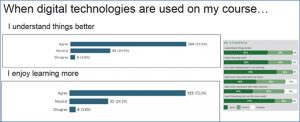
This showed how much they appreciated the use of these in their course experience, but this was also balanced by a finding that they didn’t always see the link between the use of these technologies and their impact on their employability skills:
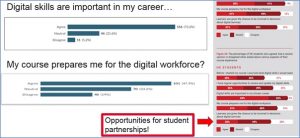
The implementation of a new Learning Environment system had also provided a refreshed opportunity to review academic staff training and development in relation to course design and digital capabilities development.
Dr Barton outlined the ‘Learning Landscape’ approach, developed by staff working in the Learning Technology and Innovation Centre, to support the delivery of academic training.
The method and approach have now been adapted and extended to meet the needs of all our staff professional development and will include digital capabilities development in the future.
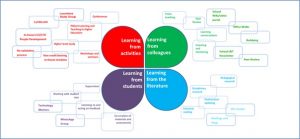
Specific approaches to training academic and academic support staff in the effective use of digital technologies for learning and teaching are delivered through our Guided Learner Journey module developed on the Canvas platform.
To engage academics, we have formed support teams of expert staff aligned to each school which deliver workshops, presentations and literally ‘knock on doors’ and ask if anyone wants any help! These teams comprise educational technologists, learning design champions, student technology mentors and librarians and have proven very effective in supporting the embedding and sharing of new practice!
Gillian Fielding shared what the benefits were to organisations participating in the UCISA digital capabilities survey. By benchmarking local provision across the broader sector, it had helped members to prioritise and stimulate strategic thinking. Most recent results point to the need to reflect digital capabilities inclusion at strategic planning level, increase engagement by other departments such as human resources, and the need to stipulate digital capabilities more clearly within job descriptions and the recruitment process for staff and prioritising the delivery of digital skills for students as a key employability outcome.
As well as being treated to an update from Jisc related to their digital wellbeing project and plans for their building digital capabilities services, we were then offered a full ‘smorgasbord’ of intriguing PechaKucha presentations and were dazzled by the awesome time keeping abilities of those presenting against the clock!
The format was particularly praised as a method to share excellent practices happening everywhere.
Dr Fiona Handley, University of Brighton, shared the research she had led on investigating staff student partnerships highlighting the types of activities which students get involved in such as digital content creation (videos), teaching digital skills training sessions, giving technical advice and presenting at conferences. She highlighted the fact that there was still some way to go in that most current projects are led by professional staff rather then led and driven by students. This highlights a need for us to consider how we might redress this balance and increase opportunities for more equal or student driven partnerships.
Joe Wilson, City of Glasgow College introduced us to the City Learning 4.0 initiative aimed at preparing students for citizenship and industry. Creative initiatives such as the introduction of ‘Digital Mondays’ and Google Educators were important initiatives to stimulate engagement with staff and students.
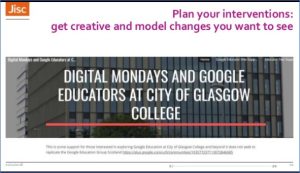
Terese Bird, Leicester Medical School, touched on the importance of adopting creative and considerate digital practices when designing and delivering digital learning.
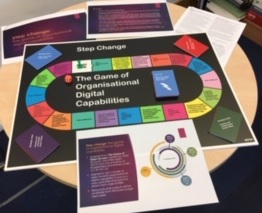
Clare Killen and I then delivered an interactive board game session based on an adaptation of the Jisc framework for organisational digital capabilities and the four-step model of strategic steps combined with a range of community-based case studies. The activity aimed to stimulate groupwork and problem solving whilst participants explored the 4 key steps of the framework through conversation, shared practice and reflective dialogue. We certainly got great feedback and you can now download of a copy of the game resources yourselves from the University of Hertfordshire Open access repository!
We rounded the day off with more stimulating PechaKucha’s delivered by Sarah Sherman, Bloomsbury Learning Environment and how they had adopted a consortium-based approach to developing a brilliant Moodle course to prepare both staff and students to be ‘digitally ready for learning’ and teaching. Piloting in 2019.
Finally, James Duke, Bishop Grosseteste University, shared the work they had delivered on building their organisational model and Alicia Wallace, Gloucestershire College, showcased how by engaging with the Jisc framework at critical points in the staff induction and annual review process in order to set goals, targets and deliver focused training and development.
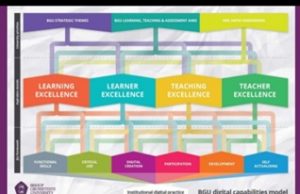
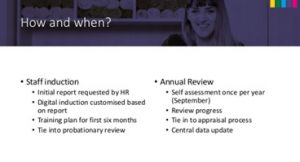
All the presentations, resources and outputs from the day are available from the Jisc building digital capabilities events page!
Non Scantlebury
Academic Engagement Manager
The University of Hertfordshire
@Nondigilib
